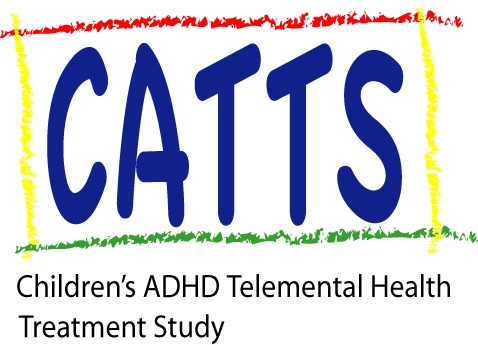What is CATTS?
CATTS is the “Children’s ADHD Telemental Health Treatment Study.” CATTS is a large federally funded study being conducted at Seattle Children’s Hospital to find out whether treatment through interactive televideo (ITV) — or telemental health — is effective in treating children’s mental health problems. Treatment sessions are free of charge.
Many children living outside of major cities do not have access to psychiatric treatment. Their primary care doctors provide much of their mental health care. But sometimes, the children are not progressing well and their doctors want assistance. Other times, families want an expert opinion. Seattle Children’s Hospital has child psychiatrists who can bring their expertise to other communities.
CATTS is especially interested in children 5.5 to 12 years old diagnosed with Attention-deficit Hyperactivity Disorder (ADHD). Children diagnosed with ADHD are bright but have difficulty succeeding academically and socially due to their inattention, hyperactivity, and impulsivity. There are well established treatments for ADHD and benefits can be realized fairly quickly. Therefore, ADHD is a good condition with which to examine whether telemental health with an expert in ADHD treatment is “value added.” That is, the research question that CATTS is addressing is “can telemental health help to improve ADHD care and outcomes for children with ADHD right in their home communities — without families traveling long distances to see an expert.
Children in the CATTS study must live in one of the five regions of Washington and Oregon that are participating in the study (please see link below). These are areas where there is limited access to child psychiatry experts but excellent primary care resources. The study provides child psychiatrists to families through IVT.
Children and their mothers both participate in the study. First, they receive a diagnostic evaluation with one of our local study therapists to confirm a diagnosis of ADHD and any other associated disorders. Then, families are randomly assigned to one of two treatment groups:
- Group A, the Stabilization Group: These children and mothers receive 6 sessions, three weeks apart, of telepsychiatry with medication management and education regarding the neurological roots of ADHD. This session is then followed by a session of parent training in managing the challenging behaviors of ADHD children. This session is conducted in-person by by one of our study therapists at the telepsychiatry clinic who works on our study. After the 6 sessions, the family returns to the child’s primary care physician for ongoing ADHD care.
- Group B, the Consultation Group: These children and mothers receive a single telepsychiatry session with a psychiatrist from Seattle Children’s Hospital who then prepares a report and makes recommendations to the referring PCP regarding treatment of the child. The PCP then treats the child for the next 25 weeks of the study.
Both Group A and Group B families complete evaluation materials at several points throughout the study. The child receives $10 for each of these assessments and mothers receive $25 for each assessment. Overall, there is a total possible payment of $245 over 25 weeks.

